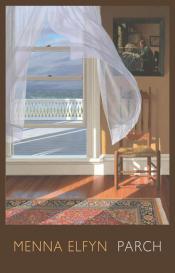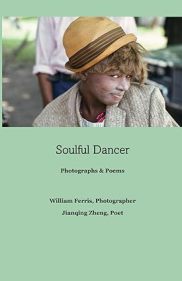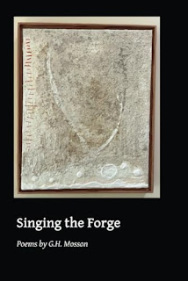
2025
OCTOBER
Bartholomew Barker, Salvatore Difalco, William Ogden Haynes, Sarah James, O. P. Jha, Beth McDonough, Gloria Ogo, Kenneth Pobo, J. R. Solonche, Kate Young.
BARTHOLOMEW BARKER
How I Learned to Write Poetry
Little boy in a yellow rain coat
and galoshes squatting in the gutter
watches the rain become a river.
He places rocks to make rapids and dams—
to punctuate the flow, but it never stops.
He loses hours building, destroying, rebuilding.
A distant call for dinner ends his work.
He returns home soggy, shivering, smiling,
eager to share his aquatic adventures.
There's the past, the future
and the current.
Bartholomew Barker works with Living Poetry. He has published a full-length collection, a chapbook and been nominated for a Pushcart and the Best of the Net. His work has recently appeared in Autumn Sky Poetry Daily, Panoply, Tipton Poetry Journal, Gyroscope Review and the Naugatuck River Review among others. www.bartbarkerpoet.com
Back to POETRY ARCHIVE
SALVATORE DIFALCO
The Ecstasy of Saint Theresa
I could not imagine such abandon,
swooning for the earnest angel,
ready to accept the golden spear
in a state of sheer baroque ecstasy.
I am moved by the vision, but more
by the lunatic delicacy required
to represent in marble folds of fabric,
hands, and the dangling foot of the saint.
If I could be thus enraptured,
thus committed to my faith
in things so lacking materiality,
would I feel more sanctified?
Would I lean back gaping,
panting, limp as sodden silk,
and let my breast be pierced
by a simpering wingèd thing?
Saint Theresa, Saint Theresa of Avila,
did Bernini do justice to your vision?
And am I doing justice to your passion
or am I just another dazzled pilgrim?
The Martyrdom of St Serapion
Your spotless habit hangs like a sheet
refulging in the pitch darkness,
source of its own spectral light,
a disembodied chiaroscuro radiance.
No sign of blood or dislocation—
save for the lifeless face, the trauma
cloaked by the creases and hang
of the fabric, or by the artist erased
as if making a case for the supremacy
of the spirit over body parts
and perforated monk flesh—
the face asleep as if cradled.
But when roped to black corners,
the hands demand closer inspection,
and one question follows another.
Who posed the saint post-crucifixion?
Who ferried him from the site?
Was he not drawn and quartered?
Was his head not fixed on a pike?
Why does he look so peaceful here?
Violence repelled the artist,
in a nutshell, and for a moment
we are led to believe the monk
died softly, softly, if not well.
Poet and storyteller Salvatore Difalco is the author of five books, including The Mountie at Niagara Falls (Anvil Press), an illustrated collection of microfiction. Recent work appears in E-ratio, Poetry Lighthouse, and Cafe Irreal. He lives in Toronto Canada.
Back to POETRY ARCHIVE
WILLIAM OGDEN HAYNES
Sailboat
Twenty miles from the marina, the wind dies down
and finally stops. The sails droop like tired flags, not
a whisper of a zephyr from the sky. The sun beats down,
the sea is like glass, the boat rocks back and forth, slack
lines slap the metal mast in an uncontrolled, eerie tattoo.
The mast against the sky swings from side to side like a
metronome with the rocking of the boat. And over the
transom, the rudder is motionless, useless without the wind.
The optimistic sailor rests his hand on the tiller as if it were
a magic wand that can entice a breeze to come out of hiding.
He waits in the heat, vigilant as a safecracker, as the boat drifts,
and seagulls circle overhead. Soon, he notices that the gulls
have no need to flap their wings. They coast and float on a
burgeoning current of air from a rising wind. He slowly tightens
his grip on the tiller and loosens the line for the mainsail.
When the sail catches its breath, the sailboat leans into the wind,
heeling over, silently sliding through the waves. Some say the
sailboat is a thread that stitches together sky and sea, suspended
between water and air. It’s sails, puffed like lungs, catch the wind
harnessing ancient forces men have tamed for centuries. There is
no hurry, just the steady pull of current and cloud in a world of
halyard, tiller and mast. Once underway, the rigging hums its tune
of clinking shackles and creaks of mast as the bow slices silently
through the water. The wind is not an enemy, but a comrade in transit.
The sailor reads the wind and bends to it, changes points of sail,
tacking and jibing to stay on course. The sailboat tells the invisible
stories of the wind by embroidering them on its wake.
William Ogden Haynes is a poet and author of short fiction from Alabama who was born in Michigan. He has published several collections of poetry and many of his poems and short stories have appeared in literary journals and anthologies. http://www.williamogdenhaynes.com
Back to POETRY ARCHIVE
SARAH JAMES
A Last Supper
The hotel at the end of the universe
has rocket-pads dotted across grey rooftops
which used to shine with solar panels.
None of them work.
The stars and stripes flag has been replaced
by a rectangle of barbed wire and a single
life ring, though five-star fine-diners
also get complimentary whistles.
Guests arrive by chauffeured dinghy, then
wade upstairs. All the beds are inflatables,
with bladderwrack blinds for the sun
and a vase of fresh shells.
Global shortages have cut the 10-course
taster menu down to four, but our staff
are Michelin-rated experts
trained in seasoning.
The ground floor long gone, our culinary
experience is always enjoyed in-room,
al fresco on the balcony, lit only
by the moon or a candle.
This way, no one can tell what they're eating,
be it lab-grown lamb, rat goulash, toad-
out-of-the-hole or the chef’s special:
spider risotto.
Sarah James/Leavesley is a prize-winning poet, fiction writer, journalist and photographer. Her latest collections are Darling Blue (forthcoming with Indigo Dreams), an ekphrastic book-length poetry narrative which won the Geoff Stevens Memorial Poetry Prize 2024, and Blood Sugar, Sex, Magic (Verve Poetry Press, 2022). Website: http://www.sarah-james.co.uk.
Back to POETRY ARCHIVE
O.P. JHA
Let me know again
Let me know who has heard songs buzzing
in the curious breathes of restless nomads again
Let me know who has felt multilayered love
folded in the humming in throbbing hearts again
Let me know who has dared to lick the drops
glittering on petals of roses in a war-field again
Let me know who has sown the seeds of love
in refugee camps longing for a piece of light again
Let me know who has overlooked complexity
and hugged simplicity in this difficult time again
Let me know who has seen clumps of leaves
with the glow-worms glowing all the night again
Let me know who has smiled in innocence again
& suddenly broken many chains of man again.
Seething
Parentheses are bubbling over
for breaking into exclamations
as ice of Alaska is melting
for trade talk between reluctant partners,
someone on the top is preparing
for fusion of hydrogen atoms
into helium and releasing tremendous energy
& marauders on the divided Earth are throttling
for chunks, craters, cracks and cleavages.
They’re ready for more fission,
From the Earth to the sky
millions of lines are drawn in little dots
like the cells carrying whims of ancestors.
Wonder is woven into common, a mask
with many layers, with dappled identities
with addresses on meandering roads
leading to mazes in minds.
& everyone looks like a phoenix risen above
out of his own ash. In the great cemetery
epitaphs look like filling up the gaps
between life and death.
In this boiling, centre has slept for ever
& paths leading nowhere, yet no one says
“I won’t make a friendship band
with a half-burnt fabric.” But he’s seething.
O.P. Jha’s works appeared in more hundred plus journals including Rigorous, Mantis, Punt Volat, Discretionary Love, In Parentheses, Shot Glass, Lothlorien Poetry, Odessa Collective, Backchannels, Poetry Pacific, Five Fleas, miniMag, Iceblink, Infinite Scroll, The Rome Review, Valiant Scribe, Kelp, pulplit etc. His poems appeared in anthologies We were Seeds and We are Resilient.
Back to POETRY ARCHIVE
BETH MCDONOUGH
Needled
Those moments we almost know nothing about,
iced-pinkied in blackthorn, trapped between rains.
no moments sung about nothing, we are stung there
iced black between trapped thorn-fingered rains.
Moments before revolutions.
moments between revelations.
Nothing about blackthorn at all,
we know of the black-fingered ice.
Scents that burn in from childhood
in the long stabbed finger which is slow
which is ready to swell through the night
which is tomorrow. Which is sloe. Almost ripe.
Copenhagen, November
Wonder through days and nights which hold
no planets in sight. In this gloom,
change's sudden strangeness arrives
loosely, then is tighter yet. Enigmas form webs.
Swarmed dark, unnoticed until
lights switch and this insect cloud
silences past, a thinning apartness
of uncarapaced heads in their stream
on a near-empty road. Silence flits
across intersections, and these come
untraceable bringers of difference,
harbingers of hope, cycled cities to be
Cycling by Highland cattle with my son
Try to toffee-wrapper this encounter,
twist up the ends, secure the herd,
put the beasts back
somewhere they never were.
Brigadoon them into a childhood
when I didn't have to pedal past
their real broody vastness,
thick with imagined intent.
Nor then did I risk assess potential directions,
headed by their handlebar horns
Not so easy now to scatter fear's matters
of what might happen if my son dismounts,
or starts that coming seizure now.
Just block out thoughts of were he
to run, would they panic, charge? Because
who asks the voiceless what they can't understand?
All this only stampedes through heads. Nothing happens.
Of course. We wheel on, steer past.
They stand, and browse, thrawn. We spin,
chew on whatever never quite happened this time.
Beth McDonough is a Dundee-based poet and artist. Her pamphlet Lamping for Pickled Fish is published by 4Word. Currently, she's working on a shared poetry collection with Nikki Robson, and a hybrid project on outdoor swimming. Both books are scheduled for publication fairly soon. She co-hosts Platform Sessions in Fife.
Back to POETRY ARCHIVE
GLORIA OGO
Where the Grease Pops Like Applause
There’s a place between 135th and don’t-you-worry
where my auntie stirs truth into red beans,
and the kitchen sings like a gospel choir
on a Sunday with no hurry.
The table’s legs are uneven,
but we balance it with old Ebony magazines—
the ones with Diana on the cover,
still fierce, still shining
through gravy stains and heat.
Here, home is the soft slap of dominoes,
the thump of bass from the back room,
the way my cousin shouts
who cut the spades like that?
and nobody answers
because the greens need tending
and the sweet tea needs more sugar
and the world is still outside,
but not here.
Not in this house.
Here, we pass stories down
with the hot sauce.
We call each other nicknames
long after we’ve outgrown them.
The screen door squeals when it closes,
and that’s how you know you made it.
Made it back.
To yourself.
To laughter that knows your middle name.
To hands that braid your edges tight
and ask about your heart while doing it.
They say home is a building—
I say it’s a hum,
a scent,
a rhythm in the rice pot.
It’s where the grease pops like applause
for every version of you that’s ever survived.
Gloria Ogo is an American-based Nigerian writer with over seven published novels and poetry collections. Her work has appeared in Eye to the Telescope, Brittle Paper, Spillwords Press, Metastellar, CON-SCIO Magazine, Kaleidoscope, The Easterner, Daily Trust, and more. With an MFA in Creative Writing, Gloria was a reader for Barely South Review. She is the winner of the Brigitte Poirson 2024 Literature Prize, the finalist for the Jerri Dickseski Fiction Prize 2024 and ODU 2025 College Poetry Prize both with honorable mentions. Her work was also longlisted for the 2025 American Short(er) Fiction Prize. https://glriaogo.wixsite.com/gloria-ogo.
Back to POETRY ARCHIVE
KENNETH POBO
Fresh Start
At the front window, pinwheels of light turn.
It’s only six a.m., dawn just awake.
The day begins, a fire about to burn.
Our black cat sits on the sill looking stern—
He stares into the yard and doesn’t shake.
At the window pinwheels of light turn.
Like a baby bird, I have much to learn
and unlearn, how to live, how not to quake.
The day begins, a fire about to burn
before sunlight fades and darkness must return—
every minute precious with much at stake.
At the window pinwheels of light turn
and turn. I let go of each fraught concern.
Fresh hours give me time to make or remake.
The day begins, a fire about to burn
away confusion. I learn to discern
how to navigate between grief and ache.
At the front window, pinwheels of light turn—
the day begins, a fire about to burn.
Kenneth Pobo has a new book out called At The Window, Silence (Fernwood Press) Forthcoming is Raylene And Skip (Wolfson Press).
Back to POETRY ARCHIVE
J. R. SOLONCHE
When I Die
When I die, I do not want
to be buried. I do not want
to decompose, slowly, agonizingly,
like a rotten tree trunk, melting,
eroding away, season after season.
I do not want to be buried.
I want to be burned like the oak
struck by lightning in the storm,
splintered, scorched and charred.
I want to be smoke and ashes,
smoke swirling upward in the air,
ashes blown by the winds over the river.
I want my transformation instantaneous
and full of light, to dazzle like a shooting star,
to astonish like a magician’s trick.
I want to disappear in a flash.
I want you to gasp, to point at nothing.
I want you to exclaim, “How did he do that?”
Today
Today I did not listen to the radio.
Today I listened to the birds, the dogs,
the children, a new roof going on.
Today I did not read the newspaper.
Today I read a letter from a cousin,
a biography of Stephen Crane, a haiku.
Today I did not watch television. Today
I watched a hawk, a cloud, a new roof
going on, a dragonfly. Today was how
it used to be every day. Today was
the way it was a long time ago. Today
was how every day was before the world
got bigger than our lives. Today was
the way every day was when the whole
world was the world of our small town.
Today was the same size every day was
when the world was the size of a garden.
Nominated for the National Book Award and twice-nominated for the Pulitzer Prize, J.R. Solonche is the author of over forty books of poetry and co-author of another. He lives in the Hudson Valley.
Back to POETRY ARCHIVE
KATE YOUNG
Attenborough on Freshwater Salmon
She finds the voice calming as she waits
her eyes jumping from glassy pane
to a grainy screen in the Highlands
a scoop of scales, thrashing tails
twisting, leaping rocky cacophony
as they silver the Falls of Feugh.
The lens captures the shifting surge
as they journey from oceans
gene receptors keen in brine.
Cut to an underwater shot, image clear
in a freshwater creek where the salmon
return each year to their spawning.
It is here the female bellies the ground
lays her eggs in gravel beds, waits
for the cloud of fertilization.
ii
A sound from outside alerts her
draws her eyes from salmon to man
navigating his way back home.
She hears the crash, the clink of liquor
bags bulging either side of his spine
gaping like gills feeding his breathing
he stumbles on pebbles, flexes muscles
strengthened by running upstream
in the constant fight for survival
Note: The Falls of Feugh are located near Banchory in Aberdeenshire. The stone bridge overlooking the waterfall is a popular spot for locals and tourists to observe salmon running upstream.
Word Gatherer
I’m foraging, collecting fruit and flower to blend into alchemy, pattern to poetry – the rich aroma of earthiness.
I pluck blackberries, purple-plump and watch the juice bramble the trug leaving
its bruised stain on paper.
Elderberries bring flavour and fortune, the rich taste of well fermented verbs
or the root of a misplaced allusion.
In the undergrowth, I truffle Chanterelles concealed among leaves, waxed flutes elusive as words that moon-whisper.
Sweet Rosehips for fullness, antidote to spite and prickle-rash of nettle, the
bitterness of scorn on skin.
I add Meadowsweet and Oxeye Daisy as dressings for metaphors and myth
but avoid Hemlock’s poison-tongue.
Shapes flap, rise in babble. They jostle and howl as consonants and vowels
fight, demanding supremacy.
I strive to guide words into tercets or verse, allow them space to breathe – to
exhale their meaning into vacant air.
Kate Young’s poetry has appeared in journals and online. It was also included in Places of
Poetry and Write Out Loud. Her pamphlets A Spark in the Darkness and Beyond the School Gate have been published with Hedgehog Press. Find her on X Kateyoung12poet or her website kateyoungpoet.co.uk
Back to POETRY ARCHIVE


